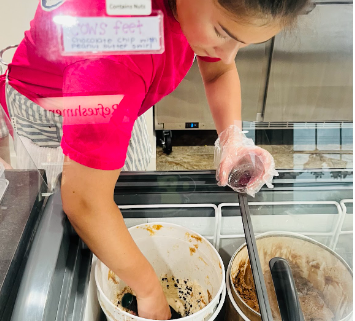Caitlin Abbott
It starts with homework. Then, eventually, becomes the classification of Honors, GT, and AP’s. Every year, the emphasis grows on extra-curricular activities, sports, and participation in community service, all while keeping up with studies, of course. And then, finally, it’s said that the only way to get into a “good” college is to succeed at all of this, become the highest achiever, and to beat out the rest of the competition, who just happen to be our peers.
But what is all of it for? The documentary Race to Nowhere addresses these issues.
On February 7, parents and students were invited to come to the auditorium to view this documentary. Mrs. Cathy Anderson, adviser of HZ Cares, organized this night with the assistance of both the high school and middle school counselors.
Sitting in on this night was intriguing. Each parent was given a form and a note card, where they could write questions they wanted to be discussed after the movie. There was also a panel of teachers and students: math teacher Mrs. Tammy Mundi, math teacher Mrs. Zahra Khanssari, U.S history teacher Mr. Joesph Bosley, Principal Mr. Andrew Last, counselors Mrs. Vicky Shields and Mrs. Susan Slater, Brooke Kilker (12), and Hudson Imhoff (12).
The questions ranged in topics. Some parents seemed to expect immediate solutions, asking “How do we get the superintendent to change the county philosophy?” and “How can we fix this?” It even seemed that some parents were targeting Hereford High staff, commenting that communication is often weak, leaving them in the dark.
For myself, this issue is a personal one. As the daughter of a teacher, I often see how parents can point blame at their child’s educator. The thing many of them don’t realize is that employed teachers have a job to do, a job that is regulated by the curriculum and the county. Parents also don’t realize that the county feels the pressure to prepare their students for college, and colleges feel pressure from the work force.
In a recent article, The Baltimore Sun examined Maryland’s average of passing AP’s compared to the national average. Erica L. Green, an Education Reporter for The Sun, found that the percentage of Maryland’s seniors who passed AP exams in 2012 was 29.5%; the national percentage of seniors who passed AP exams, 19.5%. Not only does this speak for the quality of our teachers, but it helps explain the daily pressures our teachers and students face to maintain the highest standard in the race of testing.
In reality, it’s not just the school system we need to reevaluate, but the pressures students face once our schooling is over, when students must decide what all of this education was supposed to bring us to, and what it was worth.
In Race to Nowhere, the No Child Left Behind Act is credited for contributing to the struggle of school today. This law caused a spike in homework, in 1983 through 2000, as the Federal and State governments pushed teachers and students to prepare for the test.
As the panel of AP teachers and acclaimed students addressed concerns, the parents seemed unsatisfied, as if no answer the panel gave was good enough. However, I think this panic came from the material in the documentary, and the realizations that they cannot protect their children from the stresses of the world.
The film showed students who were getting physically sick from school. Some developed eating disorders; others struggled with anxiety and lack of sleep. I believe this struck a nerve with the parents. Students struggle to keep up with massive amounts of work from several different classes, and the expectations to complete each task are significantly impacting one’s health. Every parent, at some point, sees their child struggle to complete an assignment, stay up way too late to finish a research project, and worry about a grade on a certain test all of which are on material they will probably never use again.
However, the thing parents need to remember is that the point of this film is not to demand change the second the screen goes black, but to start conversation between parent and student, student and teacher, and parents and parents.
CORRECTION
The February issue of the Hereford Harbinger stated AP teachers receive a bonus for students passing AP tests. While this does occur in some states or in the private sector, this does not occur in Maryland public school systems. The Harbinger apologizes for any confusion this may have caused.






